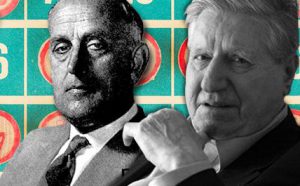
Mathmatical Bingo Strategy
Theory and Strategy
Bingo is first and foremost about luck, so there can never be a winning strategy in a game of chance. However, mathematicians have tried to formulate strategies over the years based on probability. Here we lay out some strategies but please bear in mind, this is just for historical context. These strategies will not help you win online bingo games – online bingo is a game of chance.
Basic Strategy
Let’s start simple. First, choose the site or venue you play at carefully. Consider the number of competitors against you, the number of jackpots on offer and how high each jackpot is. You preferably want as little competition as possible for as large a reward as possible. Plus, the more rewards available, the higher your chances of snagging one.
You also want to watch how much you spend to participate. For instance, buying 20 tickets may increase your winning chances, but it will reduce the amount of monetary profit upon winning as well. This is less important at land-based bingo halls, as the number of tickets you may purchase is restricted anyway.
To summarize, when all these above factors are taken into account, the payout percentage can vary from 65 to 90%; you want it to be as close to 90% as possible.
Tippett’s Strategy
Another bingo strategy was developed by British scientist Leonard Henry Caleb Tippett, an expert in statistical studies. He in fact published several scientific papers on the role of science in the gambling industry, making him something of an expert in mathematical bingo strategy. Note that Tippet’s strategy is only applicable in a traditional style game of bingo using just 75 balls, as it focuses on the fact that 38 is the median number. If you want to adapt Tippet’s theory to nowadays more common 90 ball bingo, then just use 45 as the median instead of 38!
The basic premise of Tippet’s theory is thus that the probability of matching certain numbers increases with the duration of the game. The more bingo numbers that are drawn, the more likely those numbers will be nearer to the median (either 38 or 45 as discussed above). Therefore, if you’re playing a short game and are allowed to choose your cards, it is best to choose cards with numbers nearer to 1 and 75. Alternatively, if you choose to play a longer game, then the best card to choose would be the one with number closer to 38.
Granville’s Strategy
The last bingo strategy we will cover was created by Joseph E. Granville. He agrees with Tippet that card selection is key to turning the odds in your favour. However, his method for selecting cards is totally different. This theory is actually very simple – in fact you have likely tried it before yourself, at least unconsciously. All you need to do is choose potentially winning cards by opposing the results of the previous game.
For example, if the first game is won by a card with lots of numbers ending in 2 and 3, probability is that the next winning card won’t feature these numbers. Similarly, if the second game is won by a card featuring numbers ending in 9 and 5, chances are that the next game won’t include these digits. And so on and so on and so on.
After years of research, Granville concluded that every bingo game follows a predictable pattern. Players merely need to better their understand of what the word ‘random’ truly means. His three main rules are as follows:
- There will be about the same number of the balls with numbers end on 1, 2, 3, 4, etc;
- Roughly there will be a balance of high and low numbers;
- There will be roughly a balance of odd and even numbers.
If a selection of numbers fails these tests, Granville claims that it must be considered biased and non-random. After all, the first 10 numbers called in a bingo game tend to have different ending digits, so the rest of the game should follow suit.
Conclusion
Keep in mind, Tippet and Granville’s theories are just that, theories. They are not fact, in the same way most scientific and mathematical theories are usually under intense debate. This is especially true considering the use of random number generators, a standard feature of bingo sites, which makes number selection completely random and fair. You can by any means try one of these strategies, but they will not help you win at online bingo.